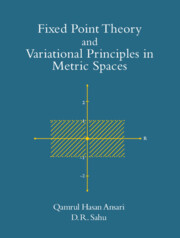Book contents
- Frontmatter
- Dedication
- Contents
- Preface
- Acknowledgments
- Notations and Abbreviations
- 1 Basic Definitions and Concepts from Metric Spaces
- 2 Fixed Point Theory in Metric Spaces
- 3 Set-valued Analysis: Continuity and Fixed Point Theory
- 4 Variational Principles and Their Applications
- 5 Equilibrium Problems and Extended Ekeland’s Variational Principle
- 6 Some Applications of Fixed Point Theory
- Appendix A Some Basic Concepts and Inequalities
- Appendix B Partial Ordering
- References
- Index
4 - Variational Principles and Their Applications
Published online by Cambridge University Press: 15 July 2023
- Frontmatter
- Dedication
- Contents
- Preface
- Acknowledgments
- Notations and Abbreviations
- 1 Basic Definitions and Concepts from Metric Spaces
- 2 Fixed Point Theory in Metric Spaces
- 3 Set-valued Analysis: Continuity and Fixed Point Theory
- 4 Variational Principles and Their Applications
- 5 Equilibrium Problems and Extended Ekeland’s Variational Principle
- 6 Some Applications of Fixed Point Theory
- Appendix A Some Basic Concepts and Inequalities
- Appendix B Partial Ordering
- References
- Index
Summary
In 1972, Ekeland [74] (see also [75, 76]) established a theorem on the existence of an approximate minimizer of a bounded below and lower semicontinuous function. This theorem is now known as Ekeland's variational principle (in short, EVP). It is one of the most applicable results from nonlinear analysis and used as a tool to study the problems from fixed point theory, optimization, optimal control theory, game theory, nonlinear equations, dynamical systems, etc.; see, for example, [15, 17, 18, 40, 74–77, 70, 135, 141] and the references therein. Several well-known fixed point results, namely, Banach contraction principle, Clarke's fixed point theorem, Caristi's fixed point theorem, Nadler's fixed point theorem, etc., can be easily derived by using EVP. Later, it was found that several well-known results, namely, the Caristi-Kirk fixed point theorem [52, 53], Takahashi's minimization theorem [168], the Petal theorem [141], and the Daneš drop theorem [68], from nonlinear analysis are equivalent to Ekeland's variational principle. Since the discovery of EVP, there have also appeared many of its extensions or equivalent formulations; see, for example, [4, 9, 12, 18, 23, 41, 66, 80, 85, 90–93, 105, 116–119, 127, 128, 135, 137–139, 141, 159, 161, 162, 165, 168, 169, 178, 181, 182] and the references therein. Sullivan [161] established that the conditions of EVP on a metric space (X, d) imply the completeness of the metric space (X, d). In 1982, McLinden [127] showed how EVP, or more precisely the augmented form of it provided by Rockafellor [149], can be adapted to extremum problems of minimax type. For further detail on the equivalence of these results, we refer to [4, 69, 85, 91, 138] and the references therein.
In this chapter, we present several forms of Ekeland's variational principle, its equivalence with Takahashi's minimization theorem and the Caristi-Kirk fixed point theorem, and some applications to fixed point theory and weak sharp minima. A variational principle given by Borwein and Preiss [39] and further revised by Li and Shi [116] is discussed. By using EVP, a fixed point theorem due to Uderzo [171] for ℋ-continuous and directional Ψ-contraction set-valued mappings is also presented.
- Type
- Chapter
- Information
- Fixed Point Theory and Variational Principles in Metric Spaces , pp. 103 - 132Publisher: Cambridge University PressPrint publication year: 2023



